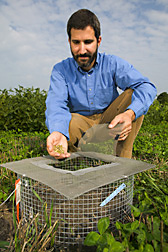This page has been archived and is being provided for reference purposes only. The page is no longer being updated, and therefore, links on the page may be invalid.
Read the magazine story to find out more. |
|
Sowing Clover Mats to Shelter Weed Seed Eaters
By Jan SuszkiwMay 3, 2006
An ecologist with the Agricultural Research Service in Urbana, Ill., is experimenting with a novel method for enlisting nature's seed-eaters—birds, rodents and insects, in this case—to help fight giant ragweed, velvetleaf and giant foxtail, all major pests of Midwestern corn and soybean crops.
Adam Davis' approach is to create a natural ground cover of red clover in farm fields so that the small critters will spend more time foraging for the weeds' energy-rich seeds and less time dodging hawks or other sharp-eyed predators.
If creating such a haven for seed foragers sounds far-fetched, consider this: A single female cricket will eat up to 50 foxtail seeds a day. Mice and ground squirrels eat even more, according to Davis, at the ARS Invasive Weeds Management Research Unit.
Using wire cages baited with seed, along with computer modeling, Davis is compiling data to estimate the impact of small animals' seed foraging on annual weed populations in wheat fields where the clover covers are used. He is also comparing wheat-clover fields with clover-free corn and soybean crops.
In another project, Davis is conducting field surveys of weed-seed concentrations on soil surfaces, in cracks, and on upright plants during harvest. He plans on furnishing information gleaned from the surveys to agricultural engineers who can build what Davis calls a "weed-seed-predator combine kit."
As he envisions it, the kit would include a vacuum head and special hammers for sucking up, crushing and spitting out destroyed weed seeds as the combine moves through a field harvesting the crop. Developed commercially, the kit could prove especially useful to organic farmers, who rank weeds as their top production problem, according to Davis.
Read more about the research in the May 2006 issue of Agricultural Research magazine.
ARS is the U.S. Department of Agriculture's chief scientific research agency.


